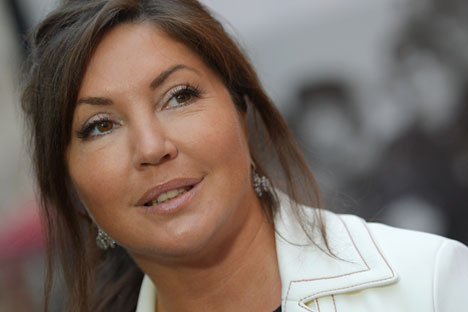
TV presenter, editorial director of the magazine The Hollywood Reporter Maria Lemesheva.
RIA Novosti/Eugene Novozhenina‘Russian Film Days’, held for the first time in Mumbai in November, will be an annual event.
The first ‘Russian Film Days’ was held in Mumbai from November 16 to 19. Beginning with the romantic comedy ‘Without Borders’ (Bez Granits), the festival featured the world premiere of ‘The Teacher’ (Uchilka) by Alexey Petrukhin, launched a week before its domestic release. Five other films were also shown; ‘Unit’ (Edinichka) by Kirill Belevich, ‘Viy’ by Oleg Stepchenko, ‘Shaggy Christmas Trees’ (Yolki Lokhmatie) by Maxim Sveshnikov and ‘The Snow Queen-2’ (Snezhnaya Koroleva-2) by Alexey Tsitsilin.
How did you select the films for the 'Russian Film Days'?
We chose the most interesting movies in their genre, to showcase the capabilities of Russian cinema. All these films have received rave reviews from audiences, and some have even won awards. We purposely did not bring art-house films. This was not due to mistrust of Indian audiences, but because of our desire to assess their preferences. Among the films shown were the drama, ‘Edinichka’ and the thriller, ‘The Teacher’.
Do you plan to make the 'Russian Film Days' a regular event?
We want to hold them regularly, to make such a festival a tradition. I believe that we have become pioneers. After the collapse of the Soviet Union, large-scale cultural exchanges with India were frozen. Now we are trying to revive this beautiful tradition, when Russian audiences were familiar with Bollywood, and vice versa.
The revival of cultural exchanges between the two countries is particularly important today, when the geopolitical and economic situation has developed in such a way that Russia and India have become more interested in each other as partners – in all areas.
Will this be an annual event?
Yes. I must admit that 'Russian Film Days' is an expensive pleasure. Staging the whole event is quite troublesome, because we want to bring only the best films. We were able to bring most of the film crews. However, most actors were too busy to come, with their schedules planned a year in advance. Bringing this delegation was hard work.
What kind of practical cooperation can there be in the field of cinema?
These may be joint movie productions, mutual film distribution. These are difficult issues, and I do not wish to claim that everything will turn out right. Nevertheless, we can plant the sprigs for further cooperation. If we can find common ground with Bollywood producers and agree on joint projects, and understand how to implement them, then, in one to three years, we will be able to bring major changes into the way we cooperate. This is a very good plan. Today we stand on the threshold of major decisions.
What do you think, do Bollywood films have distribution prospects in Russia?
Yes of course they do. I personally believe that Bollywood is clearly understood by our audiences. These movies are interesting in terms of special effects and in how they are made. Also, Indian cinema has preserved its incredible romanticism, sincerity and eternal victory of good over evil, once so beloved by Soviet audiences. This is universal for all countries, but Russian and Indian viewers are especially similar in this respect. Indian movies are often like children’s stories, which I often read to my child. These portray the eternal, timeless values for people with a heart and soul, those who can empathize.
I do not think that Indian cinema will set any box office records, but we are talking here about a mass audience, and people will find these films interesting. These will become popular, even if they don’t achieve such success as Indian cinema did in the Soviet era.
In addition, Bollywood films will be good for television broadcasting. This is an entire different layer of cooperation. Television audiences are the entire country and, among them, I have no doubt that Indian cinema will achieve great success.
Will Bollywood in Russia benefit from the devalued ruble, which has made American films more expensive for Russian distributors?
Indeed, this is a very favorable moment. I will repeat, we should primarily pay attention to television broadcasting. However, most favourable today is the current socio-political sphere; Russia is looking at greater cooperation with the BRICS countries (Brazil, Russia, India, China, South Africa), and this should be taken advantage of.
The interview was taken during ‘Russian Film Days’ festival in Mumbai.
All rights reserved by Rossiyskaya Gazeta.
Subscribe
to our newsletter!
Get the week's best stories straight to your inbox